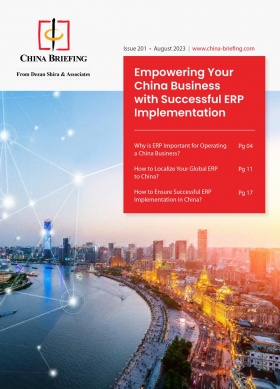Key Takeaways From the China-Central Asia Cooperation Forum
The 10th China-Central Asia Cooperation Forum in Xiamen marked a significant step in strengthening relations between China and Central Asian countries. While the forum focused on deepening political trust, expanding practical cooperation, and promoting high-quality development, key discussions also included the China-Kyrgyzstan-Uzbekistan railway project and cooperation in digital projects along the BRI.
On September 11, 2023, the city of Xiamen, in southern China, hosted the 10th edition of the China-Central Asia Cooperation Forum. This event brought together delegates and specialists from both China and the Central Asian nations to deliberate on collaborative efforts and regional development in significant domains, including the digital economy, maritime routes advancement, partnerships between cities, the contribution of women to safeguarding intangible cultural heritage, and the automotive sector.
In this article, we highlight the significant discussions and collaborative initiatives that took place during the forum, discussing key takeaways for businesses and investors.
Who was in attendance
At the forum, Kyrgyzstan was represented by Adylbek Kasymaliev, the First Deputy Chairman of the country’s Cabinet of Ministers. Acting on behalf of the President, Kasymaliev extended gratitude to the forum participants emphasizing the significance of the collaboration in the realms of the digital economy and industrial partnership. He also highlighted the substantial importance of the Belt and Road Initiative (BRI) for the nations of Central Asia. Furthermore, he expressed optimism about the prospect of further enhancing cooperation between Central Asia and China.
The forum also included a productive meeting between Adylbek Kasymaliev and Zhou Zui, the Secretary of the Party Committee of the Communist Party of China in Fujian Province. Both parties acknowledged the strong bilateral relations and engaged in discussions regarding future measures to fortify their cooperation.
In addition, the First Deputy Chairman of the Cabinet held a meeting with Shen Yueyue, the President of the All-China Women’s Federation. During this encounter, they emphasized the significance of collaboration in supporting and advancing women’s initiatives in Kyrgyzstan, especially through projects aimed at promoting women’s education and skill development.
What was discussed
During the meeting, a pivotal point of focus was the progress of the China-Kyrgyzstan-Uzbekistan railway construction project. The railway project aims to connect China with Kyrgyzstan and Uzbekistan, thereby enhancing regional connectivity and facilitating the transportation of goods and people across these Central Asian nations. The project is also a crucial part of China’s BRI efforts within the region.
Key objectives of the project include:
- Trade enhancement: By providing a direct railway connection between China and Central Asia, the project aims to boost trade by reducing transportation costs and transit times.
- Regional integration: The railway will contribute to greater regional integration among China, Kyrgyzstan, and Uzbekistan, fostering economic development and cooperation.
- Infrastructure development: The construction of the railway involves significant infrastructure development, including the building of rail lines, terminals, and related facilities, which can stimulate economic growth in the involved countries.
- Logistical efficiency: The project is expected to improve logistical efficiency and connectivity, making it easier for goods to flow between China and Central Asia.
Throughout this year’s China-Central Asia Cooperation Forum, numerous attendees voiced their aspirations to deepen this interconnectivity, creating fresh possibilities and horizons for cooperation between China and Central Asia. Fang Qiuchen, the China Association of International Contractors president, expressed that the growing integration of land and sea routes has played a pivotal role in fostering industrial collaboration between these two regions. He opined that continuous endeavors aimed at enhancing international transport facilitation and systematically enhancing communication mechanisms will infuse vitality into bilateral industrial cooperation and lay the foundation for mutually advantageous results.
Key takeaways for businesses and investors
Belt and Road Initiative: The BRI has facilitated significant trade and investment opportunities, with examples like Xiamen King Long United Automotive Industry Co., Ltd. exporting buses to Central Asian countries. Investors in the green energy and transportation sectors should take note of the market potential in Central Asian countries and explore avenues for collaboration, with China as their production base.
Interconnectivity and economic development: The BRI has promoted interconnectivity, accelerating regional economic and social development. This trend is expected to continue, providing a foundation for business growth for construction, logistics, and telecommunications companies. The ongoing efforts to enhance international transport facilitation and communication systems will facilitate smoother business operations.
China-Kyrgyzstan-Uzbekistan (CKU) Railway: The railway construction project was a focal point, offering new routes for cargo transportation. This development will significantly reduce delivery times, presenting lucrative opportunities for logistics and transport businesses.
This project has the potential to reshape cargo routes and reduce delivery times to Europe and the Middle East, making it an attractive prospect for businesses seeking to expand their presence in the region. The CKU railway enables China to decrease its reliance on transit through Russia while still facilitating rail trade with Europe.
For the project to be successful, stakeholders need to overcome technical challenges due to difficult terrain along the route, such as Kyrgyzstan’s mountainous topography.
About Us
China Briefing is written and produced by Dezan Shira & Associates. The practice assists foreign investors into China and has done so since 1992 through offices in Beijing, Tianjin, Dalian, Qingdao, Shanghai, Hangzhou, Ningbo, Suzhou, Guangzhou, Dongguan, Zhongshan, Shenzhen, and Hong Kong. Please contact the firm for assistance in China at china@dezshira.com.
Dezan Shira & Associates has offices in Vietnam, Indonesia, Singapore, United States, Germany, Italy, India, and Russia, in addition to our trade research facilities along the Belt & Road Initiative. We also have partner firms assisting foreign investors in The Philippines, Malaysia, Thailand, Bangladesh.
- Previous Article China Economic Roundup – August 2023
- Next Article China Permanent Residence Application: Explaining the Process in Shanghai







